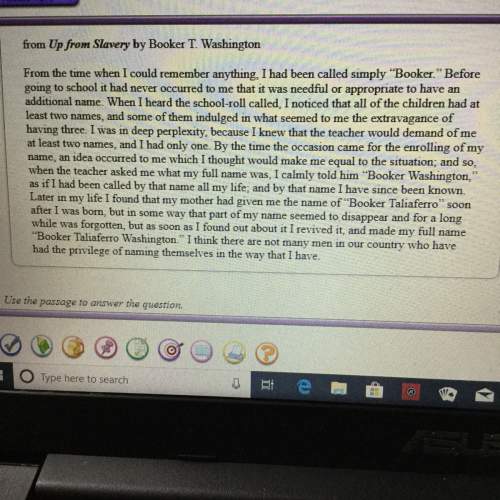
English, 12.12.2020 16:00 SakChan8367
Directions:
Read the following nonfiction and fictionalized accounts of Lewis and Clark's arrival at the Pacific Ocean in 1805. How are these accounts similar? How are they different? Use information from the passage to support your answer.
Passage:
Nonfiction
In mid-November, 1805, Lewis and Clark and their Corps of Discovery finally reached the Pacific Ocean. The expedition had left St. Louis over a year and a half earlier in order to locate the mythical "Northwest Passage," supposedly a series of rivers that would connect the east and west coasts of North America. But it didn't exist, and instead they came upon the jagged peaks of the Rocky Mountains and found only great hardship and suffering. But they persevered and pushed forward to the Pacific, where they hoped to find passage home by ship. With none to be found, they constructed Fort Clatsop and waited through another bitter winter, suffering more misery and sickness, until the weather broke and the Corps of Discovery headed east for St. Louis in late March 1806.
Fiction
The men of the Corps of Discovery scrambled down the sandy dune like children romping in a snowstorm. They charged toward the endless expanse of grey, churning water, as if touching it could erase the struggle and suffering of the last eighteen months. One by one, though, their heads moved from the hypnotic, lapping surf to the space just above the horizon line, searching for a mast or a sail, or any sign of a sailing vessel moving in the distance. And when none could be found, each face glazed over with the understanding that the journey they thought was complete was only halfway done. One by one they turned from the rhythmic, lulling Pacific and faced east, looking at the thick forests and angry mountains they had hoped never to enter again.

Answers: 2


Another question on English

English, 20.06.2019 18:04
What other seminal u.s documents does king cite in his speech?
Answers: 1

English, 21.06.2019 18:30
Read the excerpt below from "letter from birmingham jail" and then answer the question below: "my citing the creation of tension as part of the work of the nonviolent resister may sound rather shocking. but i must confess that i am not afraid of the word "tension." i have earnestly opposed violent tension, but there is a type of constructive, nonviolent tension which is necessary for growth. just as socrates felt that it was necessary to create a tension in the mind so that individuals could rise from the bondage of myths and half truths to the unfettered realm of creative analysis and objective appraisal, so must we see the need for nonviolent gadflies to create the kind of tension in society that will men rise from the dark depths of prejudice and racism to the majestic heights of understanding and brotherhood." how does king's repetition of the term "tension" impact the meaning of the text? question 5 options: dr. king says that he is afraid of the word tension and he doesn't think it is necessary. dr. king repeats the word tension to explain how he sees the word as a negative force that discourages change. dr. king repeats the word tension unintentionally, and it doesn't impact the meaning of the text. dr. king repeats the word tension to support how he views the word tension as positive and growth-producing.
Answers: 1

English, 21.06.2019 20:10
Iam for the "immediate, unconditional, and universal" enfranchisement of the black man, in ev [loud applause.] without this, his liberty is a mockery; without this, you might as well almost slavery for his condition; for in fact, if he is not the slave of the individual master, he is the slay liberty as a privilege, not as a right. he is at the mercy of the mob, and has no means of protec how does the repetition of the phrase "without this" support the paragraph's argument? it reinforces the idea that without equality in the us, the idea of a free society is a joke. it suggests that a free society is possible, with or without equal rights for all people. it indicates that douglass would be content without material possessions or status. it proposes that slavery will not be abolished in the us without the support of all citizens.
Answers: 3

English, 21.06.2019 21:30
Which best identifies the figurative language used in this passage? cannon to right of them, cannon to left of them, cannon in front of them volley’d and thunder’d; storm’d at with shot and shell, boldly they rode and well, into the jaws of death, into the mouth of hell rode the six hundred.
Answers: 1
You know the right answer?
Directions:
Read the following nonfiction and fictionalized accounts of Lewis and Clark's arrival a...
Questions

Mathematics, 12.07.2019 16:30

Mathematics, 12.07.2019 16:30


English, 12.07.2019 16:30


Spanish, 12.07.2019 16:30



Mathematics, 12.07.2019 16:30

Physics, 12.07.2019 16:30

Mathematics, 12.07.2019 16:30



History, 12.07.2019 16:30

Mathematics, 12.07.2019 16:30

English, 12.07.2019 16:30

Mathematics, 12.07.2019 16:30

Advanced Placement (AP), 12.07.2019 16:30


English, 12.07.2019 16:30




